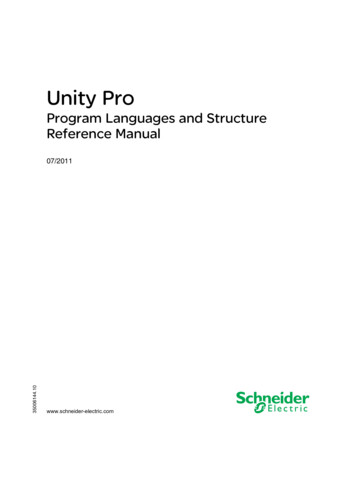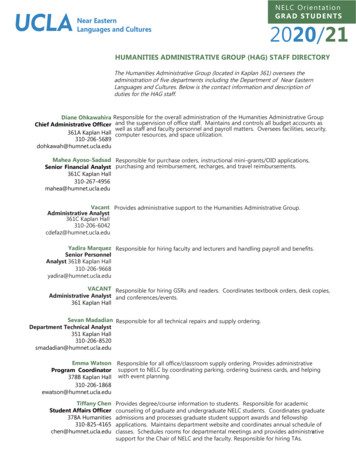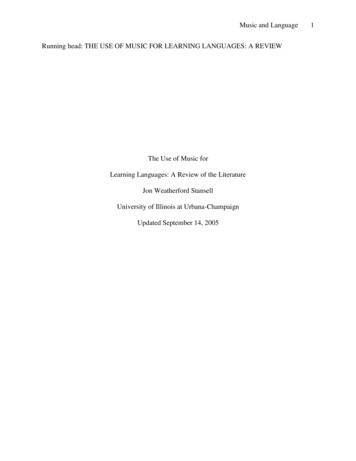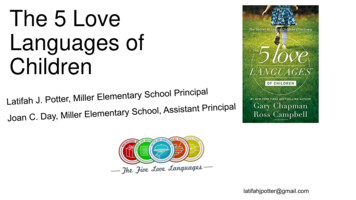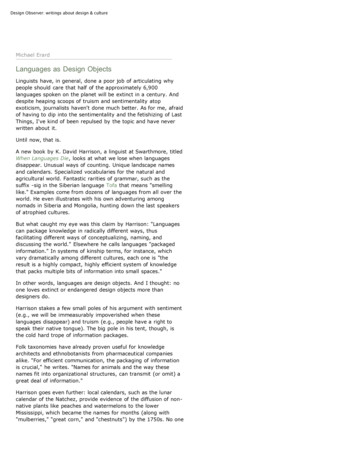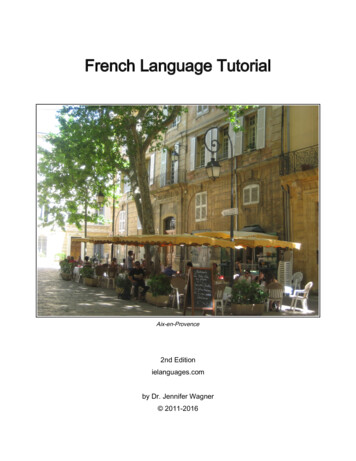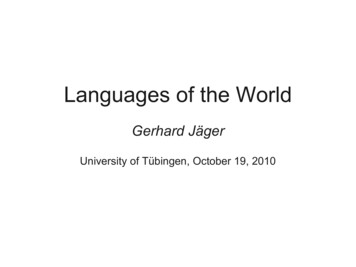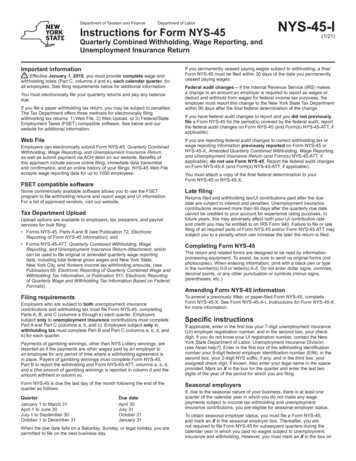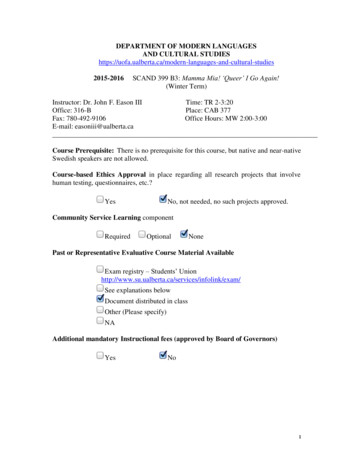
Transcription
DEPARTMENT OF MODERN LANGUAGESAND CULTURAL nd-cultural-studies2015-2016SCAND 399 B3: Mamma Mia! ‘Queer’ I Go Again!(Winter Term)Instructor: Dr. John F. Eason IIITime: TR 2-3:20Office: 316-BPlace: CAB 377Fax: 780-492-9106Office Hours: MW 2:00-3:00E-mail: easoniii@ualberta.caCourse Prerequisite: There is no prerequisite for this course, but native and near-nativeSwedish speakers are not allowed.Course-based Ethics Approval in place regarding all research projects that involvehuman testing, questionnaires, etc.?YesNo, not needed, no such projects approved.Community Service Learning componentRequiredOptionalNonePast or Representative Evaluative Course Material AvailableExam registry – Students’ xam/See explanations belowDocument distributed in classOther (Please specify)NAAdditional mandatory Instructional fees (approved by Board of Governors)YesNo1
Course Description and Objectives:Of all the musical groups and individuals to have gone on to attract large gay followings,the status of Abba – the Swedish super group from the 70s – as international gay icons isunrivalled. While it may seem unlikely that a group consisting of two heterosexualcouples could go on to achieve deistic status in gay culture, Abba’s consistently strongpresence in the world’s LGBTQIA communities cannot be ignored. The objective of thiscourse is two-fold: firstly to introduce a phenomenon, which until the 90s was largelyhidden from mainstream society, and secondly to explore ways in which queer fansunderstand, identify with and relate to the visual, aural and performative aspects of Abbain ways that often differ significantly from mainstream interpretations.Before one can understand Abba’s undeniably ubiquitous status in gay culture, one mustfirst understand the group and their music within the social, cultural, political andhistorical contexts in which the group members lived, created and performed, thus thecourse will also trace the development of the band starting from the early days inSweden in the 1960s before the formation of Abba to their breakthrough at theEurovision Song Contest in 1974, from Abba-mania in Europe and beyond, to theunofficial dissolution of the group in the 1980s, from the gay-led Abba revival a decadelater, to the internationally-acclaimed ‘Mamma Mia’! The Musical of the 2000s. WhileAbba’s place in the world of gay iconography will take centre stage in the course,‘Mamma Mia’ (Queer) I Go Again will also critically examine the group as artists,innovators and public personalities in their own right. Listening, watching, interpretingand discussing will provide a deeper, broader and more personal understanding of theband’s enduring appeal to both queer and straight audiences alike.At the end of the course you will have solid knowledge of the following: the history ofAbba and its four members; Swedish society in the 1970s; Swedish LGBTQIA history;camp (and its four components: aesthetics [including kitsch and sentimentality],theatricality, irony and humour); musical genres crucial to understanding Abba and theirqueer appeal, i.e. schlager and“schlagerfestivals” (schlager festivals), namelyMelodifestivalen (The Melody Festival) and Eurovision Song Contest, glam rock, discoand Broadway-style musicals; Abba’s music in both short and feature-length films aswell as the post-modern musical. You will understand key theories and concepts centralto this course including queer theory, the gay sensibility, gay iconography, queerreceptive theory, queer identity formation and queer musical spaces. Finally, you will beable to apply what you have learned about Abba during the run of this course (that is thevisual, aural and performative aspects of the group) to another gay icon.Texts (required):All required texts will be posted on eClass available for you to download and print outas required. The articles and readings I have selected will be used as starting points toget you acquainted with and thinking about concepts central not just to Abba as gayicons but to gay iconography, culture and fandom more generally. A tentative readinglist for the course follows.2
Tentative Reading List for Course:Babuscio, Jack. "The Cinema of Camp (AKA Camp and the Gay Sensibility." Camp:Queer Aesthetics and the Performing Subject : A Reader. By Fabio Cleto.Ann Arbor: University of Michigan, 1999. 117-35. Print.Bronski, Michael. "Part 2: Opera: Mad Queens and Other Divas." Culture Clash:The Making of Gay Sensibility. Boston, MA: South End, 1984. 134-143. Print.---. "Part 3: The Theory of the Pleasure Class." Culture Clash: The Makingof Gay Sensibility. Boston, MA: South End, 1984. 198-214. Print.Champagne, John. “Dancing Queen? Feminist and Gay Male Spectatorship inThree Recent Films from Australia.” Film Criticism 21 (1998): 66-88. Print.Creekmur, Corey K., and Alexander Doty. "The Great Escape." Out in Culture:Gay, Lesbian, and Queer Essays on Popular Culture. Durham: Duke UP,1995. 60-70. Print.Doty, Alexander. "Chapter 1: There's Something Queer Here." Making ThingsPerfectly Queer: Interpreting Mass Culture. Minneapolis: U of Minnesota,1993. 1-16. Print.Lemish, Dafna. "Ch. 11: Gay Brotherhood: Israeli Gay Men and the Eurovision SongContest." A Song for Europe: Popular Music and Politics in the EurovisionSongContest. Ed. Ivan Raykoff and Robert Deam Tobin. Aldershot,England: Ashgate, 2007. 123-34. Print.Raykoff, Ivan. "Chapter 1: Camping on the Borders of Europe." A Song for Europe:Popular Music and Politics in the Eurovision Song Contest. Ed. Ivan Raykoffand Robert Deam Tobin. Aldershot, England: Ashgate, 2007. 2-12. Print.Storey, John, and John Storey. "Chapter 6: Music." Cultural Studies and the Studyof Popular Culture. Athens: U of Georgia, 2003. 110-29. Print.Tobin, Robert Deam. "Chapter 3: Eurovision at 50: Post-Wall and Post-Stonewall."A Song for Europe: Popular Music and Politics in the Eurovision SongContest. Ed. Ivan Raykoff Raykoff and Robert Deam Tobin. Aldershot,England: Ashgate, 2007. 25-35. Print.3
Grade Distribution (see “Explanatory ntative date: Thurs., Feb. 18, 2016)Group Presentation Pre-assignment 10%(Due date TBA)Group Presentation20%(To be presented in class. Times TBA)Final25%(Tuesday, April 19, 2016 @2pm)Date of Deferred Final Exam (if /23.5.html#23.5.6(3)Explanatory Notes on Assignments and Percentage Breakdown:Attendance and participation – 20%:It is absolutely essential that you come to class. Missing even one day will putyou at a disadvantage. While Power Point presentations will be posted on eClassthey are not intended as stand-ins or substitutions for the lectures. There issimply way too much information to be included on them. If you must miss it isyour responsibility to consult with a fellow classmate. Absences will reflect inthe attendance and participation portion of your grade. Film screenings arerequired, as they are integral to the course. Out of respect for your classmatesand me please be on time.Midterm – 25%:The midterm will consist of four sections. You’ll be asked to answer onequestion from each. If you’ve attended lectures regularly, studied the powerpoints thoroughly, are well acquainted with the concepts and arguments dealtwith and have examples under your belt to support your arguments and/orstatements, you should be in good shape.Group Presentation Pre-assignment – 10%:A detailed outline addressing your key points will be required. So that I havesufficient time to provide you with feedback and for you to implement it theassignment must be handed in at the prescribed date (TBA). Presentations willneed to be kept to around 15 and no longer than 20 minutes, thus preparedness,organization and structure are paramount. Every group must select a differentartist, which must be approved by me.4
Group Presentation – 20%:For your group presentation I would like for you together with three or four otherstudents to present an analysis of a popular gay icon in the music industry basedon what you have learned about Abba (that is the visual, aural and performativeaspects of the group) during the run of this course. Specifically, applying whatyou have learned about camp and its four components: aesthetics, irony,theatricality and humour I would like for you to explore why your artist appealsto gay fans. The overarching questions you will want to address and keep inmind throughout are: Why is your artist a ‘gay icon’?What is it about your artist’s appearance, music and performances that begs thetitle of ‘gay icon’?How does he or she reflect a ‘gay sensibility’?What is his or her relationship to gay fans?What do your artist’s gay fans have to say about him or her?These are all issues you should consider in your analysis. In terms of length I think 1520 minutes is adequate. You’re encouraged to use video clips as I have done, but pleasemake sure what you are showing is relevant to your analysis and no longer than 3-4minutes. The bulk should be on your analysis, a “queer reading” if you like.Final – 25%:In terms of format the final will resemble the midterm. The final will cover materialdealt with since the midterm.Cell Phones & Laptops:Use of cell phones is not permitted in the classroom. Use of laptops will be permitted incertain cases; however, you will need to clear this with me first.Required Notes:“Policy about course outlines can be found in Section 23.4(2) of the Universitycalendar.”Academic Integrity:“The University of Alberta is committed to the highest standards of academic integrityand honesty. Students are expected to be familiar with these standards regardingacademic honesty and to uphold the policies of the University in this respect. Studentsare particularly urged to familiarize themselves with the provisions of the Code ofStudent Behaviour (online aviour.aspx) and avoid any behaviour which could potentially result insuspicions of cheating, plagiarism, misrepresentation of facts and/or participation in anoffence. Academic dishonesty is a serious offence and can result in suspension orexpulsion from the University.”5
Learning and Working Environment:The Faculty of Arts is committed to ensuring all students; faculty and staff are able tostudy and work in an environment safe and free of discrimination and harassment. Itdoes not tolerate behaviour that undermines that environment. The Department urgesanyone who feels this policy has been or is being violated to: Discuss the matter with the person whose behaviour is causing concern; or If that discussion is unsatisfactory, or there is concern that directs discussion isinappropriate or threatening, discuss it with the Chair of the Department.For additional advice or assistance regarding this policy you may contact the studentombudservice (http://www.ombudservice.ualberta.ca/).Information about the University of Alberta Discrimination and HarassmentPolicy and Procedures is described in UAPPOL dures/Pages/DispPol.aspx?PID 110Academic Honesty:All students should consult the information provided by the Office of JudicialAffairs regarding avoiding cheating and plagiarism in particular and academicdishonesty in general (see the Academic Integrity Undergraduate Handbook andInformation for Students). If in doubt about what is permitted in this class, askthe instructor.Students involved in language courses and translation courses should be aware thaton-line “translation engines” produce very dubious and unreliable “translations.”Students in languages courses should be aware that, while seeking the advice of nativeor expert speakers is often helpful, excessive editorial and creative help inassignments is considered a form of “cheating” that violates the code of student conductwith dire consequences.An instructor or coordinator who is convinced that a student has handed in workthat he or she could not possibly reproduce without outside assistance is obliged,out of consideration of fairness to other students, to report the case to theAssociate Dean of the Faculty. See the Academic Discipline ProcessRecording of Lectures:Audio or video recording of lectures, labs, seminars or any other teaching environmentby students is allowed only with the prior written consent of the instructor or as a part ofan approved accommodation plan. Recorded material is to be used solely for personalstudy, and is not to be used or distributed for any other purpose without prior writtenconsent from the content author(s).Attendance, Absences, and Missed Grade Components:Regular attendance is essential for optimal performance in any course. In cases ofpotentially excusable absences due to illness or domestic affliction, notify yourinstructor by e-mail within two days. Regarding absences that may be excusable andprocedures for addressing course components missed as a result, consult sections23.3(1) and 23.5.6 of the University Calendar. Be aware that unexcused absences will6
result in partial or total loss of the grade for the “attendance and participation”component(s) of a course, as well as for any assignments that are not handed-in orcompleted as a result.*In this course, student/instructor communication is important. If a student knows ofupcoming absences, the instructor should be notified. If not, the instructor should benotified as soon as possible to be able to offer instructions regarding missed material,and/or assistance. Moreover, in this course attendance and participation go hand in hand.When a student is absent, his/her level of participation in class cannot be assessed. The20% allotted for attendance and class participation is based on effort and activeengagement in shown when in attenda
and Broadway-style musicals; Abba’s music in both short and feature-length films as well as the post-modern musical. You will understand key theories and concepts central to this course including queer theory, the gay sensibility, gay iconography, queer receptive theory, queer identity formation and queer musical spaces. Finally, you will be able to apply what you have learned about Abba .
